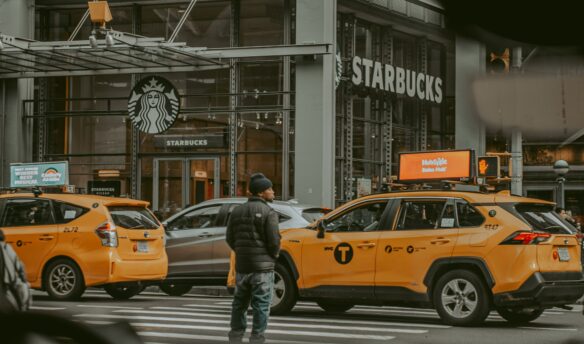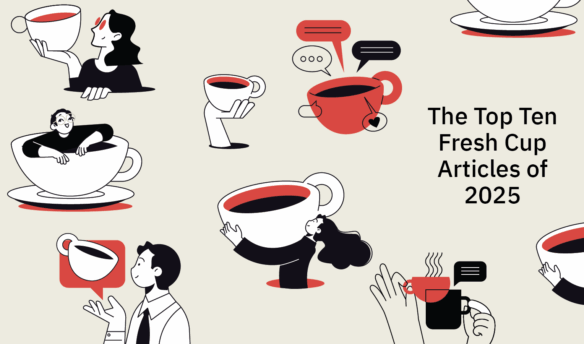Coava Coffee closes its downtown Portland cafe. Plus, the Specialty Coffee Association examines the role of cupping in the coffee industry, and the Pavement Coffeehouse union alleges LGBTQ+ discrimination.
‘SCA Paper Questions Roles and Skills Associated with Coffee Cupping’ – via Daily Coffee News
Coffee cupping is a key evaluation tool for coffee professionals. A new white paper from the Specialty Coffee Association (SCA) examines the role of cupping and professional cuppers and argues that their importance and scope have grown within the industry—beyond simply being an evaluative tool.
The SCA posits that “cuppers are highly skilled, not just as ‘tasters’ (although this skill is foundational to the role), but as subject matter experts who may discover, support, ensure, and communicate the quality of coffee while acting as key market linkages within the coffee value chain.”
Coffee cupping is a way to analyze or compare coffee samples and assess quality, flavor, and aroma characteristics. Coffee pros often use cupping to quantify quality (literally—during cupping, some will use a rubric to give coffee a score between 0-100) throughout the supply chain, from roasters and quality-control professionals to green buyers, importers, and producers.
The paper calls for an expanded understanding of the role, emphasizing that professional cuppers have evolved to evaluate quality and communicate value. A cupper’s assessment can be used throughout the supply chain to demonstrate a coffee’s worth to interested parties, all the way through to the end consumer, in the form of tasting notes.
The white paper notes that cupping was once seen as a specialized skill. But over the past few years, it has “become a more inclusive practice, offering a way to spread understanding of a coffee and its value throughout an organization, or along a supply chain.”
This paper is the first from the SCA’s cupping task force, formed last year with a mix of volunteers and invited organizational representation. It is part of a larger move from the association to redefine and reimagine its approach to coffee evaluation, which will include a new cupping protocol due out to “early adopters” later this year.
‘Downtown Portland Coffee Shop Announces Closure, Cites Safety Concerns’ – via Oregon Live
Coava Coffee permanently closed its downtown Portland cafe citing “extreme violence and criminal activity” endured by its staff “on an almost daily basis for the last few years.”
The announcement, posted to the company’s social media accounts, notes that the “frequency and severity” of these incidents have been increasing. The company also claims to have “brought all the resources to bear that we have access to,” including “doubling up on shifts, locking one entrance, de-escalation training, hazard pay, and heightened management oversight.”
Oregon Live interviewed an employee at the downtown cafe, who claimed that the justification for closing went beyond the safety of customers and workers, most of whom will likely lose their jobs. Barista Robert Wilcox said that the real reasons might have more to do with a lack of profitability than any real safety concerns. “Management’s reasoning made it sound like we’re in a war zone down here and that’s not really true,” Wilcox said. “I do think it’s been unsafe, so while it might be the right decision, they’re sort of using those concerns as an excuse.”
The Coava statement echoes similar rhetoric used by Starbucks when it closed multiple locations in cities across the US in 2022, pointing to “a high volume of challenging incidents that make it unsafe to continue to operate.” Starbucks Workers United filed a labor complaint in response, claiming that the closures—many of which were unionized or unionizing—amounted to coercive union-busting.
‘Brighton Pavement Coffeehouse Management Accused of LGBTQ+ Discrimination’ – via the Daily Free Press
Unionized workers at Pavement Coffeehouse in Massachusetts alleged “mistreatment and intimidation by management towards queer and transgender workers.” The company suspended five workers and fired four after they called out of work over fears for their safety. All four fired workers were trans, and two were misgendered in their termination letters.
The company claimed the walkout was an illegal work stoppage that “explicitly and knowingly” violated the terms of their union contract. “We have never fired or taken disciplinary action against an employee for their LGBTQ+ identity, nor will we ever,” Pavement founder Larry Margulies said in an emailed statement to the Daily Free Press. “That being said, every employee deserves a fair investigation and must be held equally accountable.”
Pavement UNITED said the walkout was “an act of self preservation.” According to the union, workers reported transphobic behaviors at Pavement locations for a year, which the company failed to meaningfully address.
Maro de Laforcade, a shift supervisor and former union shop steward, said that it was Pavement that was violating their contract. “The reason that the employees did what they did in the first place, which was call out of work, is because they didn’t feel safe at work, which is indicative that Pavement was violating the zero-tolerance policy for gender-based discrimination that is in our contract,” de Laforcade said.
In 2021, Marguiles voluntarily recognized Pavement UNITED, and the union ratified its first contract a year later, making Pavement the first unionized coffee shop in Massachusetts.
More News
‘LGBTQ-affirming Coffee Shop in The Woodlands Faces Backlash’ – via OutSmart Magazine
‘Bandits Break Into Seattle Coffee Gear To Steal iPhones From Adjacent Apple Store’ – via Sprudge
‘Acaia Unveiling a Grinder Static Neutralizer Called the Ion Beam’ – via Daily Coffee News
‘Registration is Now Open for First SCA Educator Summit’ – via Global Coffee Report
‘Brazil Soy, Coffee Farmers Bolstered by Fertilizer Price Falls’ – via Reuters
‘Go Fund Bean Is Going All Out At SCA Expo In Portland’ – via Fresh Cup Magazine
‘Direct Trade’ Green Coffee Platform Algrano Makes US Launch’ – via Daily Coffee News
‘AeroPress Releases Flow Control Filter Cap, Other New Products Rumored’ – via Sprudge
The Week in Coffee Unionizing
As workers at Blank Street Coffee locations across New York City look to unionize, the company itself has held back from standard union-busting techniques. Four of the five neighborhood clusters that have held elections voted yes, meaning 26 out of more than 40 locations have unionized.
Workers interviewed by Hell Gate tell of a more restrained response from management than the ones that have typified union drives at Starbucks, Amazon, and other companies: “Blank Street Union members said that the company has largely bitten its tongue when it comes to discouraging union activity, although they’re conscious of the fact that could change once it’s time to start bargaining a contract.”
The baristas speculate it comes down to optics—just look at how Starbucks’ response has hurt its progressive image—and Blank Street’s relatively small size. “Even if Blank Street wanted to do hardcore union-busting, they probably wouldn’t be able to afford it,” one barista said.
Speaking of Starbucks: organizers inched closer to a big milestone as workers at a location in Pleasanton, CA, voted to join the union, bringing the number of unionized stores across the country to 299. “We’re so excited that with our union, we now have a seat at the table in our workplace decisions,” organizer and barista Elise Lester said in a statement. “Whether you work at a Starbucks cafe or another retail store, we encourage you to join us in trying to create more workplaces by and for the workers.”
Is Coffee Good For You?
Coffee could be good for your gut microbiome, according to a new study from the United States. Researchers from the Baylor College of Medicine in Houston, TX, examined 97 donated colonic biopsies and compared their findings to a food consumption questionnaire that included questions about coffee.
The study, published in Nutrients, found an inverse relationship between caffeine intake and levels of Erysipelatoclostridium as well as “higher richness and evenness of gut microbiota.” Erysipelatoclostridium is a bacterial species that has previously been linked to inflammation, type 2 diabetes, and depression. Basically: more coffee, less bad bacteria.
“Our study sheds light on the associations between caffeine intake and coffee consumption and the gut microbiota of individuals with endoscopically normal colons,” the researchers write. “The association between caffeine, gut microbiota, and health outcomes and the role of Erysipelatoclostridium in metabolic diseases deserves further investigation.”
Beyond the Headlines
‘The Sensory Story Of Color In Coffee’ by Jenn Chen
‘March Forward, Dear Mother Ethiopia’ by Christopher Feran
‘In Colombia, a Story of Coffee, Family, and Climate Change’ by Luke Ottenhof







